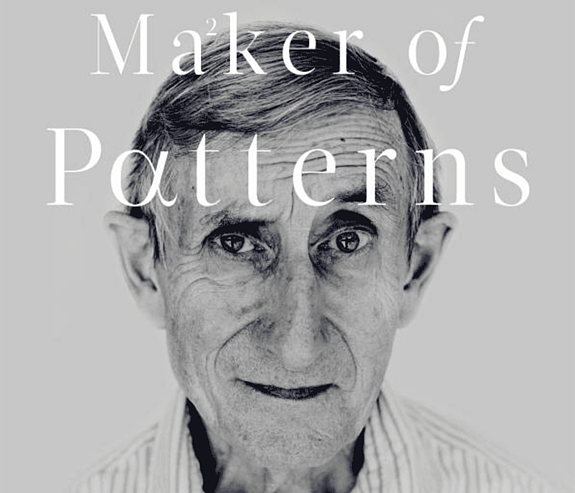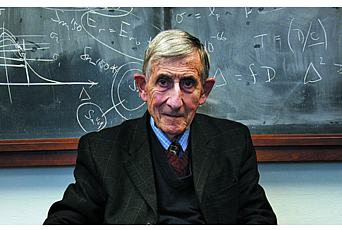IAS to Celebrate Publication of Freeman Dyson's Maker of Patterns
Press Contact

The Institute for Advanced Study will celebrate the publication of Maker of Patterns: An Autobiography Through Letters by Freeman Dyson, Professor Emeritus in the School of Natural Sciences, with a public event at 5:30 p.m. on Friday, April 13, in Wolfensohn Hall on the Institute campus.
The work is a collection of Dyson’s letters to relatives, written between 1940 and the late 1970s, and features the Institute, past Director J. Robert Oppenheimer, Hans Bethe, Richard Feynman, Stephen Hawking, and others engaged in solving the quandaries of twentieth-century physics. The letters cover the period when Dyson first arrives at the Institute in 1948, among a small group of young physicists invited by Oppenheimer to work as a Member at the Institute, to his subsequent appointment to the Faculty in 1953 before the age of thirty. He is today the longest-serving Professor in the Institute’s history, having first come to the Institute when the institution was less than twenty years old and having worked with seven of its nine Directors.
The program will include a brief reading followed by a conversation between Freeman Dyson and IAS Director and Leon Levy Professor Robbert Dijkgraaf. Books will be available for purchase at this event, and a reception will follow in the Fuld Hall Common Room.
The son of composer Sir George Dyson and Mildred Atkey, Dyson was born in Crowthorne, England, on December 15, 1923. He worked as a civilian scientist for the Royal Air Force in World War II, and graduated from Cambridge University in 1945 with a B.A. degree in mathematics. He went on to Cornell University as a graduate student in 1947 and worked with Hans Bethe and Richard Feynman. One of Dyson’s most notable contributions to science was the unification of the three versions of quantum electrodynamics invented by Feynman, Julian Schwinger, and Sin-Itiro Tomonaga. Dyson then worked on nuclear reactors, solid state physics, ferromagnetism, astrophysics, and biology, looking for problems where mathematics could be usefully applied. One of the world’s most original thinkers, Dyson has been heavily invested in human issues, from arms control and space travel to climate studies, and is the author of numerous articles and books about science for the general public, including Disturbing the Universe (1979), Weapons and Hope (1984), Origins of Life (1985), Infinite in All Directions (1988), Imagined Worlds (1998), and The Sun, the Genome, and the Internet (1999).
Dyson is a fellow of the American Physical Society, a member of the U.S. National Academy of Sciences, a foreign member of the Russian Academy of Sciences, an honorary member of the London Mathematical Society, and a fellow of the Royal Society of London. His many awards include the Henri Poincaré Prize awarded by the International Mathematical Physics Congress in 2012; the Templeton Prize for Progress in Religion in 2000; the Enrico Fermi Award given by the U.S. Department of Energy in 1995; the Oersted Medal awarded by the American Association of Physics Teachers in 1991; the Wolf Prize in physics in 1981; the Max Planck Medal of the German Physical Society in 1969; the Lorentz Medal of the Royal Netherlands Academy in 1966; and the Dannie Heineman Prize for Mathematical Physics by the American Institute of Physics and American Physical Society in 1965.
This event is free and open to the public, but registration is required. To register for this event, visit www.ias.edu/events/dyson-celebration. For more information on other public lectures and events at the Institute, visit www.ias.edu/events.
About the Institute for Advanced Study
The Institute for Advanced Study is one of the world’s leading centers for theoretical research and intellectual inquiry. The Institute exists to encourage and support curiosity-driven research in the sciences and humanities—the original, often speculative thinking that produces advances in knowledge that change the way we understand the world. Work at the Institute takes place in four Schools: Historical Studies, Mathematics, Natural Sciences and Social Science. It provides for the mentoring of scholars by a permanent Faculty, and it ensures the freedom to undertake research that will make significant contributions in any of the broad range of fields in the sciences and humanities studied at the Institute.
The Institute, founded in 1930, is a private, independent academic institution located in Princeton, New Jersey. Its more than 8,000 former Members have held positions of intellectual and scientific leadership throughout the academic world. Thirty-three Nobel Laureates and 41 out of 56 Fields Medalists, as well as many winners of the Wolf and MacArthur prizes, have been affiliated with the Institute.


